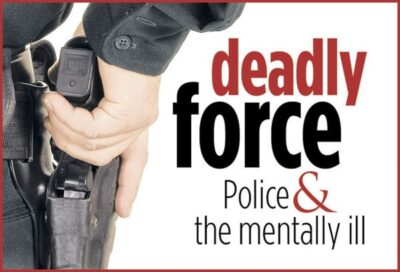
Five fatal police shootings of mentally ill examined by Portland Press Herald/Maine Sunday Telegram.
(3-25-23) When you call the police because a family member is in the midst of a serious mental health crisis, you are desperate for help. But despite years of encouraging officers to undergo Crisis Intervention Team training, tragedies continue to happen.
My son, Kevin, was shot twice with tasers when we sought help from the Fairfax County (Va.) Police. We were lucky. Last July, Fairfax Police officers fatally shot Jasper Aaron Lynch, 26, inside his parent’s home after they asked for help and CIT officers responded.
The death of Irvo Otieno in Henrico County, Va., has sparked national coverage and outrage as officials scramble to explain what happened. I received a phone call asking me to reserve judgment immediately after Otieno’s death, but as more and more information leaks out, it is difficult to believe this was an unavoidable “accident.”
Virginia’s political leaders need to investigate what went wrong and implement changes. One would be to stop the police for filing assault charges against an individual in a mental health crisis if they become violent. Unless the assaults lead to a serious injury, such charges only exasperate a problem. (They often are based on spitting at an officer or shoving a hospital worker.)
Otieno was charged with felony assault on law enforcement – five criminal charges – even though he was in the psychiatric unit of a hospital exhibiting what many psychiatrists would deem symptoms of his mental illness.
As Otieno’s outraged mother, Caroline Ouko, told reporters: “Mental illness should not be your ticket to death.”
Sadly, the Otieno death joins a long list of preventable tragedies that have claimed lives in Virginia dating back to the 2007 Virginia Tech shootings that killed 32 people and wounded 17 others.
Let’s see how Virginia officials respond this time around.
Irvo Otieno’s death points to failings of the mental health care system
By Patrick Wilson Richmond Times-Dispatch
The death of Irvo Otieno comes after years of discussions by state officials about how to deal with mental illness when it intersects with criminal justice, a moment that can mean life and death.
The issue is pending in the General Assembly, where Senate Democrats want to significantly boost new funding for mental health programs above the $135 million proposed by Gov. Glenn Youngkin.
Advocates for appropriate responses to people in mental health crises say Virginia has made progress, but it’s been far too slow.
Otieno, 28, was placed in the custody of Henrico County sheriff’s deputies on March 3 and died after they pinned him to the ground at Central State Hospital in Dinwiddie County on March 6, according to a prosecutor and lawyers for his family. Advocates for reform said his death illustrates how Virginia continues punting such cases into the hands of local law enforcement.
Otieno’s death generated national attention but is not the first high-profile situation to shine light on the failings of Virginia’s mental health care system.
Sen. Creigh Deeds, D-Bath, pushed for mental health reform after his son, Gus, 24, attacked him and died by suicide in 2013 after a bed was not available for Gus in a psychiatric facility. Deeds was able to help the state create a subcommittee on mental health reform, which is now a state commission.
Jamycheal Mitchell, 24, died in 2015 in the Hampton Roads Regional Jail, where he had been taken for stealing snacks from a convenience store. His death prompted the state legislature to put focus on reviews of deaths in jails, but a board that oversees investigations has had a backlog of cases and has faced interference from the Virginia Department of Corrections.

A Richmond police officer fatally shot high school teacher Marcus-David Peters in 2018 while Peters was in mental health crisis, running unarmed and naked at the officer and threatening to kill him. That led the legislature to create the Marcus Alert system, but Peters’ sister, Princess Blanding, slammed the action after lawmakers watered down the original proposal.
Continued systemic failures
A state watchdog agency found in December that dozens of Virginians each day who need a bed in a state mental health facility instead end up on a waiting list.
“I think there’s been really good progress in getting people’s attention. We now have a behavioral health legislation commission with full-time staff and investigative capacity,” said Bruce Cruser, executive director of the advocacy organization Mental Health America of Virginia.
“It’s not happening fast enough. It’s taken so long to get to this point that the system has been in crisis itself for a long time, and it’s going to take some time to build up the resources and the improved network of care so we don’t have this many people falling into crisis, so they can get help sooner in their own community rather than be shipped off to a state hospital or jail.”
Otieno was taken to Parham Doctors’ Hospital for mental health treatment on March 3 after an incident with a neighbor, according to his mother, Caroline Ouko. She said she was not allowed to see him at the hospital and, after an incident there with Henrico police officers, the officers opted to take Otieno to jail to be booked on three felony charges of assaulting an officer as well as misdemeanor charges of disorderly conduct on hospital grounds and intentionally destroying or damaging a police uniform. Details on what happened at the hospital between police and Otieno have not been made clear.
Transfers of someone in mental health crisis to a local jail are a huge problem, Cruser said.
“Once that happens, you’re automatically moving the person from the mental health system to the criminal justice system,” he said. “They treat someone as a criminal and not as a person with an illness.”



